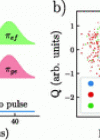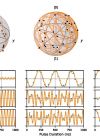Anatoly Kulikov
Anatoly has completed his thesis on "In situ quantum control over superconducting qubits" and joined Quantum Device Lab at ETH Zürich
Anatoly have graduated from Saint-Petersburg State University, Russia, in 2015. His research work was concerned with theoretical physics, with both bachelor's diploma and master's thesis being dedicated to applications of quantum field theory to statistical physics. Particularly, he worked with models of developed turbulence with spontaneously violated parity. Having some additional programming experience and being interested in less abstract fields of physics, Anatoly joined SQD lab for three months (November 2015 - February 2016) as a visiting academic to undertake research training in superconducting quantum circuits.
He came back to SQD Lab as a PhD student in July 2016 to continue his research work on superconducting quantum circuits.








